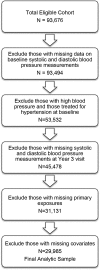Coffee and caffeine consumption and the risk of hypertension in postmenopausal women
- PMID: 26657046
- PMCID: PMC4691674
- DOI: 10.3945/ajcn.115.120147
Coffee and caffeine consumption and the risk of hypertension in postmenopausal women
Abstract
Background: The associations of coffee and caffeine intakes with the risk of incident hypertension remain controversial.
Objective: We sought to assess longitudinal relations of caffeinated coffee, decaffeinated coffee, and total caffeine intakes with mean blood pressure and incident hypertension in postmenopausal women in the Women's Health Initiative Observational Study.
Design: In a large prospective study, type and amount of coffee and total caffeine intakes were assessed by using self-reported questionnaires. Hypertension status was ascertained by using measured blood pressure and self-reported drug-treated hypertension. The mean intakes of caffeinated coffee, decaffeinated coffee, and caffeine were 2-3 cups/d, 1 cup/d, and 196 mg/d, respectively. Using multivariable linear regression, we examined the associations of baseline intakes of caffeinated coffee, decaffeinated coffee, and caffeine with measured systolic and diastolic blood pressures at annual visit 3 in 29,985 postmenopausal women who were not hypertensive at baseline. We used Cox proportional hazards models to estimate HRs and their 95% CIs for time to incident hypertension.
Results: During 112,935 person-years of follow-up, 5566 cases of incident hypertension were reported. Neither caffeinated coffee nor caffeine intake was associated with mean systolic or diastolic blood pressure, but decaffeinated coffee intake was associated with a small but clinically irrelevant decrease in mean diastolic blood pressure. Decaffeinated coffee intake was not associated with mean systolic blood pressure. Intakes of caffeinated coffee, decaffeinated coffee, and caffeine were not associated with the risk of incident hypertension (P-trend > 0.05 for all).
Conclusion: In summary, these findings suggest that caffeinated coffee, decaffeinated coffee, and caffeine are not risk factors for hypertension in postmenopausal women.
Keywords: blood pressure; caffeinated coffee; caffeine; decaffeinated coffee; hypertension.
© 2016 American Society for Nutrition.
Figures

Similar articles
-
Caffeinated coffee, decaffeinated coffee and endometrial cancer risk: a prospective cohort study among US postmenopausal women.Nutrients. 2011 Nov;3(11):937-50. doi: 10.3390/nu3110937. Epub 2011 Nov 2. Nutrients. 2011. PMID: 22254087 Free PMC article.
-
Caffeine intake from coffee and tea and invasive breast cancer incidence among postmenopausal women in the Women's Health Initiative.Int J Cancer. 2021 Dec 15;149(12):2032-2044. doi: 10.1002/ijc.33771. Epub 2021 Sep 6. Int J Cancer. 2021. PMID: 34418085
-
Effects of caffeinated coffee consumption on intraocular pressure, ocular perfusion pressure, and ocular pulse amplitude: a randomized controlled trial.Eye (Lond). 2012 Aug;26(8):1122-30. doi: 10.1038/eye.2012.113. Epub 2012 Jun 8. Eye (Lond). 2012. PMID: 22678051 Free PMC article. Clinical Trial.
-
Coffee, diabetes, and weight control.Am J Clin Nutr. 2006 Oct;84(4):682-93. doi: 10.1093/ajcn/84.4.682. Am J Clin Nutr. 2006. PMID: 17023692 Review.
-
Habitual coffee consumption and blood pressure: an epidemiological perspective.Vasc Health Risk Manag. 2008;4(5):963-70. doi: 10.2147/vhrm.s3055. Vasc Health Risk Manag. 2008. PMID: 19183744 Free PMC article. Review.
Cited by
-
Dietary caffeine intake is associated with favorable metabolic profile among apparently healthy overweight and obese individuals.BMC Endocr Disord. 2023 Oct 20;23(1):227. doi: 10.1186/s12902-023-01477-1. BMC Endocr Disord. 2023. PMID: 37864190 Free PMC article.
-
Western and Modern Mexican dietary patterns are directly associated with incident hypertension in Mexican women: a prospective follow-up study.Nutr J. 2018 Feb 14;17(1):21. doi: 10.1186/s12937-018-0332-3. Nutr J. 2018. PMID: 29444692 Free PMC article.
-
Coffee and caffeine consumption in women affected by hypertension.J Hum Hypertens. 2018 Jun;32(6):463-464. doi: 10.1038/s41371-018-0048-z. Epub 2018 Mar 7. J Hum Hypertens. 2018. PMID: 29515195 No abstract available.
-
Long-term outcomes from the UK Biobank on the impact of coffee on cardiovascular disease, arrhythmias, and mortality: Does the future hold coffee prescriptions?Glob Cardiol Sci Pract. 2023 May 11;2023(2):e202313. doi: 10.21542/gcsp.2023.13. eCollection 2023 May 11. Glob Cardiol Sci Pract. 2023. PMID: 37351100 Free PMC article.
-
Coffee and Arterial Hypertension.Curr Hypertens Rep. 2021 Aug 9;23(7):38. doi: 10.1007/s11906-021-01156-3. Curr Hypertens Rep. 2021. PMID: 34370111 Free PMC article. Review.
References
-
- Fiebach NH, Hebert PR, Stampfer MJ, Colditz GA, Willett WC, Rosner B, Speizer FE, Hennekens CH. A prospective study of high blood pressure and cardiovascular disease in women. Am J Epidemiol 1989;130:646–54. - PubMed
-
- Levy D, Larson MG, Vasan RS, Kannel WB, Ho KK. The progression from hypertension to congestive heart failure. JAMA 1996;275:1557–62. - PubMed
-
- Kearney PM, Whelton M, Reynolds K, Muntner P, Whelton PK, He J. Global burden of hypertension: analysis of worldwide data. Lancet 2005;365:217–23. - PubMed
-
- He J, Whelton PK. Epidemiology and prevention of hypertension. Med Clin North Am 1997;81:1077–97. - PubMed
-
- Zhang Z, Hu G, Caballero B, Appel L, Chen L. Habitual coffee consumption and risk of hypertension: a systematic review and meta-analysis of prospective observational studies. Am J Clin Nutr 2011;93:1212–9. - PubMed
Publication types
MeSH terms
Substances
Grants and funding
LinkOut - more resources
Full Text Sources
Other Literature Sources
Medical

